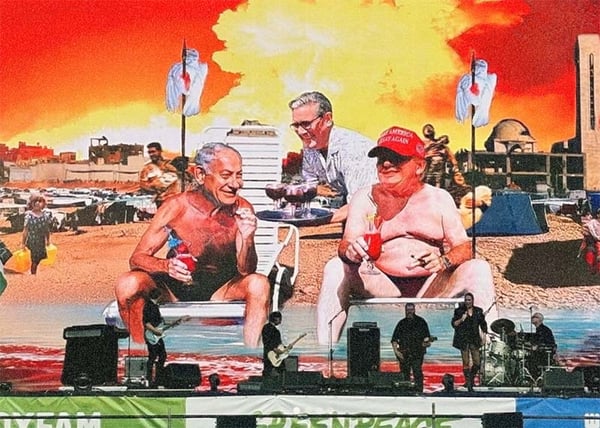Music trumped by politics
Charli xcx, Nile Rodgers, or opposition to genocide? By far, the biggest talking point from Glastonbury Festival was Israel's assault on Gaza. ”I just don't like seeing people killed,” Nadine Shah said at the end of her set, which featured digital artworks depicting Western complicity in ongoing war crimes. Gary Lineker, Paloma Faith, and dozens more artists waved Palestine flags, called out hypocrisy, and led ”Free Palestine” chants.
Glastonbury is one of Europe's biggest festivals, running from Tuesday last week through to Monday. Profits from the event mostly go to charities, such as Oxfam, War Child, and the Red Cross. This year, 210,000 lucky people got tickets to see the likes of Olivia Rodrigo, Scissor Sisters, and Lewis Capaldi. Millions more tuned in online.
But Glastonbury has always had a political edge. This year it was Kneecap, an Irish hip hop trio, that was perhaps the most anticipated act. Known for their anti-colonial, pro-Palestine stance, the group spearheads a revival of the Irish language and advocates a boycott against Israel. One member also faces trial in the UK for allegedly waving a Hezbollah flag.
British PM Keir Starmer called for Glastonbury's organisers to cancel Kneecap's performance, while the BBC – which has exclusive broadcasting rights – chose not to livestream the set for ”editorial” reasons.
Post-festival headlines focused on an inflammatory chant by a punk band against Israel's army. Politicians were quick to share their outrage. But here's a rundown of concurrent events: the day before, an Israeli outlet reported that IDF officials instructed soldiers to shoot at Gazans collecting food.
The day after Glastonbury, Israeli strikes killed at least 23 people close to aid distribution centres – plus a further 21 at a cafe in Gaza City. Zooming out, Britain continues to supply military components used by Israel. The EU remains its largest trading partner.

